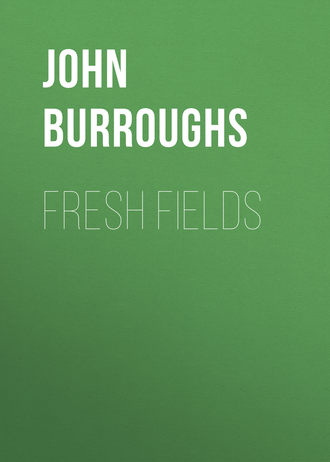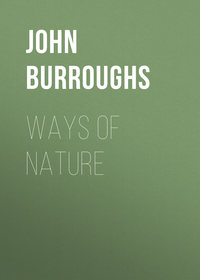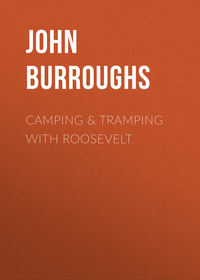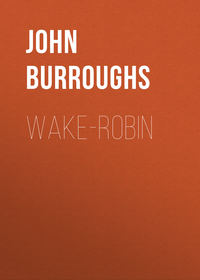 полная версия
полная версияFresh Fields

Fresh Fields
I
NATURE IN ENGLAND
I
The first whiff we got of transatlantic nature was the peaty breath of the peasant chimneys of Ireland while we were yet many miles at sea. What a homelike, fireside smell it was! it seemed to make something long forgotten stir within one. One recognizes it as a characteristic Old World odor, it savors so of the soil and of a ripe and mellow antiquity. I know no other fuel that yields so agreeable a perfume as peat. Unless the Irishman in one has dwindled to a very small fraction, he will be pretty sure to dilate his nostrils and feel some dim awakening of memory on catching the scent of this ancestral fuel. The fat, unctuous peat, – the pith and marrow of ages of vegetable growth, – how typical it is of much that lies there before us in the elder world; of the slow ripenings and accumulations, of extinct life and forms, decayed civilizations, of ten thousand growths and achievements of the hand and soul of man, now reduced to their last modicum of fertilizing mould!
With the breath of the chimney there came presently the chimney swallow, and dropped much fatigued upon the deck of the steamer. It was a still more welcome and suggestive token, – the bird of Virgil and of Theocritus, acquainted with every cottage roof and chimney in Europe, and with the ruined abbeys and castle walls. Except its lighter-colored breast, it seemed identical with our barn swallow; its little black cap appeared pulled down over its eyes in the same manner, and its glossy steel-blue coat, its forked tail, its infantile feet, and its cheerful twitter were the same. But its habits are different; for in Europe this swallow builds in chimneys, and the bird that answers to our chimney swallow, or swift, builds in crevices in barns and houses.
We did not suspect we had taken aboard our pilot in the little swallow, yet so it proved: this light navigator always hails from the port of bright, warm skies; and the next morning we found ourselves sailing between shores basking in full summer sunshine. Those who, after ten days of sorrowing and fasting in the desert of the ocean, have sailed up the Frith of Clyde, and thence up the Clyde to Glasgow, on the morning of a perfect mid-May day, the sky all sunshine, the earth all verdure, know what this experience is; and only those can know it. It takes a good many foul days in Scotland to breed one fair one; but when the fair day does come, it is worth the price paid for it. The soul and sentiment of all fair weather is in it; it is the flowering of the meteorological influences, the rose on this thorn of rain and mist. These fair days, I was told, may be quite confidently looked for in May; we were so fortunate as to experience a series of them, and the day we entered port was such a one as you would select from a hundred.
The traveler is in a mood to be pleased after clearing the Atlantic gulf; the eye in its exuberance is full of caresses and flattery, and the deck of a steamer is a rare vantage-ground on any occasion of sight-seeing; it affords just the isolation and elevation needed. Yet fully discounting these favorable conditions, the fact remains that Scotch sunshine is bewitching, and that the scenery of the Clyde is unequaled by any other approach to Europe. It is Europe, abridged and assorted and passed before you in the space of a few hours, – the highlands and lochs and castle-crowned crags on the one hand; and the lowlands, with their parks and farms, their manor halls and matchless verdure, on the other. The eye is conservative, and loves a look of permanence and order, of peace and contentment; and these Scotch shores, with their stone houses, compact masonry, clean fields, grazing herds, ivied walls, massive foliage, perfect roads, verdant mountains, etc., fill all the conditions. We pause an hour in front of Greenock, and then, on the crest of the tide, make our way slowly upward. The landscape closes around us. We can almost hear the cattle ripping off the lush grass in the fields. One feels as if he could eat grass himself. It is pastoral paradise. We can see the daisies and buttercups; and from above a meadow on the right a part of the song of a skylark reaches my ear. Indeed, not a little of the charm and novelty of this part of the voyage was the impression it made as of going afield in an ocean steamer. We had suddenly passed from a wilderness of waters into a verdurous, sunlit landscape, where scarcely any water was visible. The Clyde, soon after you leave Greenock, becomes little more than a large, deep canal, inclosed between meadow banks, and from the deck of the great steamer only the most charming rural sights and sounds greet you. You are at sea amid verdant parks and fields of clover and grain. You behold farm occupations – sowing, planting, plowing – as from the middle of the Atlantic. Playful heifers and skipping lambs take the place of the leaping dolphins and the basking swordfish. The ship steers her way amid turnip-fields and broad acres of newly planted potatoes. You are not surprised that she needs piloting. A little tug with a rope at her bow pulls her first this way and then that, while one at her stern nudges her right flank and then her left. Presently we come to the ship-building yards of the Clyde, where rural, pastoral scenes are strangely mingled with those of quite another sort. "First a cow and then an iron ship," as one of the voyagers observed. Here a pasture or a meadow, or a field of wheat or oats, and close beside it, without an inch of waste or neutral ground between, rise the skeletons of innumerable ships, like a forest of slender growths of iron, with the workmen hammering amid it like so many noisy woodpeckers. It is doubtful if such a scene can be witnessed anywhere else in the world, – an enormous mechanical, commercial, and architectural interest, alternating with the quiet and simplicity of inland farms and home occupations. You could leap from the deck of a half-finished ocean steamer into a field of waving wheat or Winchester beans. These vast shipyards appear to be set down here upon the banks of the Clyde without any interference with the natural surroundings of the place.
Of the factories and foundries that put this iron in shape you get no hint; here the ships rise as if they sprouted from the soil, without waste or litter, but with an incessant din. They stand as thickly as a row of cattle in stanchions, almost touching each other, and in all stages of development. Now and then a stall will be vacant, the ship having just been launched, and others will be standing with flags flying and timbers greased or soaped, ready to take to the water at the word. Two such, both large ocean steamers, waited for us to pass. We looked back, saw the last block or wedge knocked away from one of them, and the monster ship sauntered down to the water and glided out into the current in the most gentle, nonchalant way imaginable. I wondered at her slow pace, and at the grace and composure with which she took to the water; the problem nicely studied and solved, – just power enough, and not an ounce to spare. The vessels are launched diagonally up or down stream, on account of the narrowness of the channel. But to see such a brood of ships, the largest in the world, hatched upon the banks of such a placid little river, amid such quiet country scenes, is a novel experience. But this is Britain, – a little island, with little lakes, little rivers, quiet, bosky fields, but mighty interests and power that reach round the world. I was conscious that the same scene at home would have been less pleasing. It would not have been so compact and tidy. There would not have been a garden of ships and a garden of turnips side by side; haymakers and shipbuilders in adjoining fields; milch-cows and iron steamers seeking the water within sight of each other. We leave wide margins and ragged edges in this country, and both man and nature sprawl about at greater lengths than in the Old World.
For the rest I was perhaps least prepared for the utter tranquillity, and shall I say domesticity, of the mountains. At a distance they appear to be covered with a tender green mould that one could brush away with his hand. On nearer approach it is seen to be grass. They look nearly as rural and pastoral as the fields. Goat Fell is steep and stony, but even it does not have a wild and barren look. At home, one thinks of a mountain as either a vast pile of barren, frowning rocks and precipices, or else a steep acclivity covered with a tangle of primitive forest timber. But here, the mountains are high, grassy sheep-walks, smooth, treeless, rounded, and as green as if dipped in a fountain of perpetual spring. I did not wish my Catskills any different; but I wondered what would need to be done to them to make them look like these Scotch highlands. Cut away their forests, rub down all inequalities in their surfaces, pulverizing their loose bowlders; turf them over, leaving the rock to show through here and there, – then, with a few large black patches to represent the heather, and the softening and ameliorating effect of a mild, humid climate, they might in time come to bear some resemblance to these shepherd mountains. Then over all the landscape is that new look, – that mellow, legendary, half-human expression which nature wears in these ancestral lands, an expression familiar in pictures and in literature, but which a native of our side of the Atlantic has never before seen in gross, material objects and open-air spaces, – the added charm of the sentiment of time and human history, the ripening and ameliorating influence of long ages of close and loving occupation of the soil, – naturally a deep, fertile soil under a mild, very humid climate.
There is an unexpected, an unexplained lure and attraction in the landscape, – a pensive, reminiscent feeling in the air itself. Nature has grown mellow under these humid skies, as in our fiercer climate she grows harsh and severe. One sees at once why this fragrant Old World has so dominated the affections and the imaginations of our artists and poets: it is saturated with human qualities; it is unctuous with the ripeness of ages, the very marrowfat of time.
II
I had come to Great Britain less to see the noted sights and places than to observe the general face of nature. I wanted to steep myself long and well in that mellow, benign landscape, and put to further tests the impressions I had got of it during a hasty visit one autumn, eleven years before. Hence I was mainly intent on roaming about the country, it mattered little where. Like an attic stored with relics and heirlooms, there is no place in England where you cannot instantly turn from nature to scenes and places of deep historical or legendary or artistic interest.
My journal of travel is a brief one, and keeps to a few of the main lines. After spending a couple of days in Glasgow, we went down to Alloway, in Burns's country, and had our first taste of the beauty and sweetness of rural Britain, and of the privacy and comfort of a little Scotch inn. The weather was exceptionally fair, and the mellow Ayrshire landscape, threaded by the Doon, a perpetual delight. Thence we went north on a short tour through the Highlands, – up Loch Lomond, down Loch Katrine, and through the Trosachs to Callander, and thence to Stirling and Edinburgh. After a few days in the Scotch capital we set out for Carlyle's country, where we passed five delightful days. The next week found us in Wordsworth's land, and the 10th of June in London. After a week here I went down into Surrey and Hants, in quest of the nightingale, for four or five days. Till the middle of July I hovered about London, making frequent excursions into the country, – east, south, north, west, and once across the channel into France, where I had a long walk over the hills about Boulogne. July 15 we began our return journey northward, stopping a few days at Stratford, where I found the Red Horse Inn sadly degenerated from excess of travel. Thence again into the Lake region for a longer stay. From Grasmere we went into north Wales, and did the usual touring and sight-seeing around and over the mountains. The last week of July we were again in Glasgow, from which port we sailed on our homeward voyage July 29.
With a suitable companion, I should probably have made many long pedestrian tours. As it was, I took many short but delightful walks both in England and Scotland, with a half day's walk in the north of Ireland about Moville. 'Tis an admirable country to walk in, – the roads are so dry and smooth and of such easy grade, the footpaths so numerous and so bold, and the climate so cool and tonic. One night, with a friend, I walked from Rochester to Maidstone, part of the way in a slow rain and part of the way in the darkness. We had proposed to put up at some one of the little inns on the road, and get a view of the weald of Kent in the morning; but the inns refused us entertainment, and we were compelled to do the eight miles at night, stepping off very lively the last four in order to reach Maidstone before the hotels were shut up, which takes place at eleven o'clock. I learned this night how fragrant the English elder is while in bloom, and that distance lends enchantment to the smell. When I plucked the flowers, which seemed precisely like our own, the odor was rank and disagreeable; but at the distance of a few yards it floated upon the moist air, a spicy and pleasing perfume. The elder here grows to be a veritable tree; I saw specimens seven or eight inches in diameter and twenty feet high. In the morning we walked back by a different route, taking in Boxley Church, where the pilgrims used to pause on their way to Canterbury, and getting many good views of Kent grain-fields and hop-yards. Sometimes the road wound through the landscape like a footpath, with nothing between it and the rank-growing crops. An occasional newly-plowed field presented a curious appearance. The soil is upon the chalk formation, and is full of large fragments of flint. These work out upon the surface, and, being white and full of articulations and processes, give to the ground the appearance of being thickly strewn with bones, – with thigh bones greatly foreshortened. Yet these old bones in skillful hands make a most effective building material. They appear in all the old churches and ancient buildings in the south of England. Broken squarely off, the flint shows a fine semi-transparent surface that, in combination with coarser material, has a remarkable crystalline effect. One of the most delicious bits of architectural decoration I saw in England was produced, in the front wall of one of the old buildings attached to the cathedral at Canterbury, by little squares of these flints in brick panel-work. The cool, pellucid, illuminating effect of the flint was just the proper foil to the warm, glowing, livid brick.
From Rochester we walked to Gravesend, over Gad's Hill; the day soft and warm, half sunshine, half shadow; the air full of the songs of skylarks; a rich, fertile landscape all about us; the waving wheat just in bloom, dashed with scarlet poppies; and presently, on the right, the Thames in view dotted with vessels. Seldom any cattle or grazing herds in Kent; the ground is too valuable; it is all given up to wheat, oats, barley, hops, fruit, and various garden produce.
A few days later we walked from Feversham to Canterbury, and from the top of Harbledown hill saw the magnificent cathedral suddenly break upon us as it did upon the footsore and worshipful pilgrims centuries ago. At this point, it is said, they knelt down, which seems quite probable, the view is so imposing. The cathedral stands out from and above the city, as if the latter were the foundation upon which it rested. On this walk we passed several of the famous cherry orchards of Kent, the thriftiest trees and the finest fruit I ever saw. We invaded one of the orchards, and proposed to purchase some of the fruit of the men engaged in gathering it. But they refused to sell it; had no right to do so, they said; but one of them followed us across the orchard, and said in a confidential way that he would see that we had some cherries. He filled my companion's hat, and accepted our shilling with alacrity. In getting back into the highway, over the wire fence, I got my clothes well tarred before I was aware of it. The fence proved to be well besmeared with a mixture of tar and grease, – an ingenious device for marking trespassers. We sat in the shade of a tree and ate our fruit and scraped our clothes, while a troop of bicyclists filed by. About the best glimpses I had of Canterbury cathedral – after the first view from Harbledown hill – were obtained while lying upon my back on the grass, under the shadow of its walls, and gazing up at the jackdaws flying about the central tower and going out and in weather-worn openings three hundred feet above me. There seemed to be some wild, pinnacled mountain peak or rocky ledge up there toward the sky, where the fowls of the air had made their nests, secure from molestation. The way the birds make themselves at home about these vast architectural piles is very pleasing. Doves, starlings, jackdaws, swallows, sparrows, take to them as to a wood or to a cliff. If there were only something to give a corresponding touch of nature or a throb of life inside! But their interiors are only impressive sepulchres, tombs within a tomb. Your own footfalls seem like the echo of past ages. These cathedrals belong to the pleistocene period of man's religious history, the period of gigantic forms. How vast, how monstrous, how terrible in beauty and power! but in our day as empty and dead as the shells upon the shore. The cold, thin ecclesiasticism that now masquerades in them hardly disturbs the dust in their central aisles. I saw five worshipers at the choral service in Canterbury, and about the same number of curious spectators. For my part, I could not take my eyes off the remnants of some of the old stained windows up aloft. If I worshiped at all, it was my devout admiration of those superb relics. There could be no doubt about the faith that inspired those. Below them were some gorgeous modern memorial windows: stained glass, indeed! loud, garish, thin, painty; while these were like a combination of precious stones and gems, full of depth and richness of tone, and, above all, serious, not courting your attention. My eye was not much taken with them at first, and not till after it had recoiled from the hard, thin glare in my immediate front.
From Canterbury I went to Dover, and spent part of a day walking along the cliffs to Folkestone. There is a good footpath that skirts the edge of the cliffs, and it is much frequented. It is characteristic of the compactness and neatness of this little island, that there is not an inch of waste land along this sea margin; the fertile rolling landscape, waving with wheat and barley, and with grass just ready for the scythe, is cut squarely off by the sea; the plow and the reaper come to the very brink of the chalky cliffs. As you sit down on Shakespeare's Cliff, with your feet dangling in the air at a height of three hundred and fifty feet, you can reach back and pluck the grain heads and the scarlet poppies. Never have I seen such quiet pastoral beauty take such a sudden leap into space. Yet the scene is tame in one sense: there is no hint of the wild and the savage; the rock is soft and friable, a kind of chalky bread, which the sea devours readily; the hills are like freshly cut loaves; slice after slice has been eaten away by the hungry elements. Sitting here, I saw no "crows and choughs" winging "the midway air," but a species of hawk, "haggards of the rocks," were disturbed in the niches beneath me, and flew along from point to point.
"The murmuring surge,
That on the unnumber'd idle pebbles chafes,
Cannot be heard so high."
I had wondered why Shakespeare had made his seashores pebbly instead of sandy, and now I saw why: they are pebbly, with not a grain of sand to be found. This chalk formation, as I have already said, is full of flint nodules; and as the shore is eaten away by the sea, these rounded masses remain. They soon become worn into smooth pebbles, which beneath the pounding of the surf give out a strange clinking, rattling sound. Across the Channel, on the French side, there is more sand, but it is of the hue of mud and not pleasing to look upon.
Of other walks I had in England, I recall with pleasure a Sunday up the Thames toward Windsor: the day perfect, the river alive with row-boats, the shore swarming with pedestrians and picnickers; young athletic London, male and female, rushing forth as hungry for the open air and the water as young mountain herds for salt. I never saw or imagined anything like it. One shore of the Thames, sometimes the right, sometimes the left, it seems, belongs to the public. No private grounds, however lordly, are allowed to monopolize both sides.
Another walk was about Winchester and Salisbury, with more cathedral-viewing. One of the most human things to be seen in the great cathedrals is the carven image of some old knight or warrior prince resting above his tomb, with his feet upon his faithful dog. I was touched by this remembrance of the dog. In all cases he looked alert and watchful, as if guarding his master while he slept. I noticed that Cromwell's soldiers were less apt to batter off the nose and ears of the dog than they were those of the knight.
At Stratford I did more walking. After a row on the river, we strolled through the low, grassy field in front of the church, redolent of cattle and clover, and sat for an hour on the margin of the stream and enjoyed the pastoral beauty and the sunshine. In the afternoon (it was Sunday) I walked across the fields to Shottery, and then followed the road as it wound amid the quaint little thatched cottages till it ended at a stile from which a footpath led across broad, sunny fields to a stately highway. To give a more minute account of English country scenes and sounds in midsummer, I will here copy some jottings in my note-book, made then and there: —
"July 16. In the fields beyond Shottery. Bright and breezy, with appearance of slight showers in the distance. Thermometer probably about seventy; a good working temperature. Clover – white, red, and yellow (white predominating) – in the fields all about me. The red very ruddy; the white large. The only noticeable bird voice that of the yellow-hammer, two or three being within ear-shot. The song is much like certain sparrow songs, only inferior: Sip, sip, sip, see-e-e-e; or, If if, if you ple-e-ease. Honey-bees on the white clover. Turf very thick and springy, supporting two or three kinds of grass resembling red-top and bearded rye-grass. Narrow-leaved plantain, a few buttercups, a small yellow flower unknown to me (probably ladies' fingers), also a species of dandelion and prunella. The land thrown into marked swells twenty feet broad. Two Sunday-school girls lying on the grass in the other end of the field. A number of young men playing some game, perhaps cards, seated on the ground in an adjoining field. Scarcely any signs of midsummer to me; no ripeness or maturity in nature yet. The grass very tender and succulent, the streams full and roily. Yarrow and cinquefoil also in the grass where I sit. The plantain in bloom and fragrant. Along the Avon, the meadow-sweet in full bloom, with a fine cinnamon odor. A wild rose here and there in the hedge-rows. The wild clematis nearly ready to bloom, in appearance almost identical with our own. The wheat and oats full-grown, but not yet turning. The clouds soft and fleecy. Prunella dark purple. A few paces farther on I enter a highway, one of the broadest I have seen, the roadbed hard and smooth as usual, about sixteen feet wide, with grassy margins twelve feet wide, redolent with white and red clover. A rich farming landscape spreads around me, with blue hills in the far west. Cool and fresh like June. Bumblebees here and there, more hairy than at home. A plow in a field by the roadside is so heavy I can barely move it, – at least three times as heavy as an American plow; beam very long, tails four inches square, the mould-board a thick plank. The soil like putty; where it dries, crumbling into small, hard lumps, but sticky and tough when damp, – Shakespeare's soil, the finest and most versatile wit of the world, the product of a sticky, stubborn clay-bank. Here is a field where every alternate swell is small. The large swells heave up in a very molten-like way – real turfy billows, crested with white clover-blossoms."









